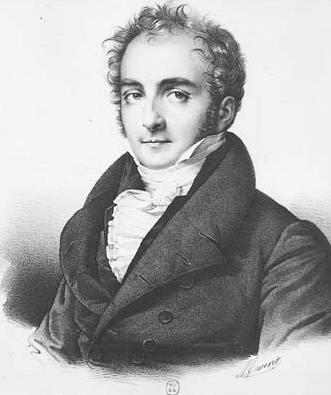- Casimir Pierre Perier
Infobox Prime Minister
name=Casimir Pierre Perier
order=11thPrime Minister of France
term_start =13 March 1831
term_end =16 May 1832
predecessor =Jacques Laffitte
successor =Duc de Dalmatie
birth_date =birth date|1777|10|11|mf=y
death_date =death date and age|1832|5|16|1777|10|11|mf=y
party=Orleanist Casimir Pierre Perier (11 October 1777ndash 16 May 1832) was a
French statesman , President of the Council during theJuly Monarchy , when he headed the conservative "Parti de la résistance" (Party of Resistance).Born in
Grenoble , he was the fourth son of a richbanker andmanufacturer , Claude Perier (1742-1801), in whose house the estates ofDauphiné met in 1788. Claude Perier was one of the first directors of theBank of France . Of his eight sons, Augustin (1773-1833), Antoine Scipion (1776-1821), and Camille (1781-1844) all distinguished themselves in industry and in politics. The family moved toParis after therevolution of Thermidor (1794), and Casimir joined the army of Italy in 1798.Career
On his father's death, Perier left the army and with his brother Scipion founded a bank in Paris, the speculations of which Casimir directed while Scipion took on its administration. Perier opposed the ruinous methods by which the duc de Richelieu sought to raise the war indemnity demanded by the Allies, in a pamphlet "Réflexions sur le projet d'emprunt" (1817), followed in the same year by "Dernières réflexions" in answer to an inspired article in the "Moniteur".
In the same year, Perier entered the
Chamber of Deputies for Paris, taking his seat in the Left Centre with the moderate opposition, and making his first speech in defence of thefreedom of the press . Re-elected for Paris in 1822 and 1824, and in 1827 for Paris and forTroyes , he elected to represent Troyes, and sat for that constituency until his death. Perier's violence in debate was not associated with any disloyalty to theBourbon Restoration , and he held resolutely aloof from the Republican conspiracies and intrigues which prepared the way for the revolution of 1830. Under the Martignac ministry, there was some prospect of a reconciliation with the court, and, in January 1829, he was nominated a candidate for the presidency of the chamber; but in August with the elevation to power ofJules, Prince de Polignac , the truce ceased, and on the 15 March 1830, Perier was one of the 221 deputies who repudiated the Ordinances put forward by Charles X.Averse by instinct and by interest to popular revolution, Perier nevertheless sat on the provisory commission of five at the
Hôtel-de-ville during theThree Glorious Days of July 1830, but he refused to sign the declaration of Charles X's dethronement. Perier reluctantly recognized in the government of Louis Philippe'sconstitutional monarchy the only alternative to the continuance of the Revolution, but he was no favorite with the new king, whom he scorned for his truckling to the mob. He became President of the Chamber of Deputies, and sat for a few months in the cabinet, though without a portfolio.President of the Council
On the fall of the weak and discredited ministry of
Jacques Laffitte , Perier, who had drifted more and more to the Right, was summoned to power (13 March 1831), and, in the short space of a year, he more or less restored civic order in France and re-established her credit in Europe. Paris was in a constant state of disturbance from March to September, and was only held in check by the premier's determination. TheCanut Revolt atLyon was suppressed after hard fighting; and at Grenoble, in face of the quarrels between the military and the inhabitants, Perier declined to make any concession to the townsfolk.As a minister, Perier refused to be dragged into armed intervention in favor of the revolutionary government of
Warsaw , but his policy of peace did not exclude energetic demonstrations in support of French interests. He constituted France the protector ofBelgium by the prompt expedition of the army of the north against the Dutch in August 1831. French influence inItaly was asserted by the audacious occupation ofAncona (23 February 1832); and the refusal of compensation for injuries to French residents by the Portuguese government was followed by a naval demonstration atLisbon .Perier had undertaken the premiership with many forebodings, and overwork and anxiety prepared the way for disease. In the spring of 1832, during thecholera outbreak in Paris, he visited the hospitals in company with the duke of Orleans. He fell ill the next day of a violent fever, and died six weeks later.His son
Auguste Casimir-Perier (1811-1876) was also a French politician, and his family continued to be prominent in French politics for generations.References
*1911
*His "Opinions et discours" were edited by A. Lesieur (2 vols., 1838); C. Nicoullaud published in 1894 the first part ("Casimir-Perier, député de l'opposition", 1817-1830) of a study of his life and policy; and his ministry is exhaustively treated byPaul Thureau-Dangin in vols. 1. and ii. (1884) of his "Histoire de la monarchie de juillet".
*For the family in general see E. Choulet, "La Famille Casimir Perier" (Grenoble, 1894).
Wikimedia Foundation. 2010.
